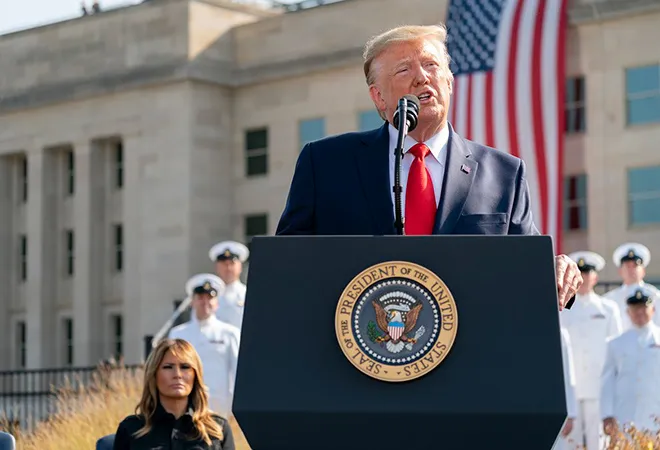United States President Donald Trump has failed to meet his deadline of September 1 for a peace agreement with the Taliban. He has also cancelled his planned meeting with the leaders of the extremist militia. There were many reasons for this. In part, the Taliban began celebrating too early and began to give the perception of a government-in-waiting, negotiating a transfer of power. The Pakistan military, intermediaries on behalf of the Taliban, were similarly exultant. A pushback was inevitable. Taliban-backed terror attacks only helped.
The rush towards a deal with the Taliban risked completely marginalising the formally-elected government in Kabul. That government has its limitations and Afghan democracy is far from perfect. Yet, in the past 18 years, since the removal of the Taliban in 2001, Afghanistan has seen gains in social and gender reforms, development and capacity building, and political and economic evolution. This has come at a great price. In the United States, there is a sense of sacrifice of blood and treasure.
To walk away with no guarantee of the gains being sustained — and with the Taliban giving no assurances of mending its ways, sharing power, or even ceasing to harbour terrorists — was always foolhardy. The bet in Rawalpindi, and among the Taliban, has been that Trump is essentially an isolationist whose constituency is fatigued by war; and he wants to withdraw from global security responsibilities. That is why the Taliban played hardball. It was convinced the White House would agree to just about anything, if only to ensure substantial troop withdrawals before the 2020 US presidential election.
Trump is never consistent; his last decision is only as final as his last tweet. In the months ahead, he will continue to seek an exit strategy. The “remainers” — those in the American system who worry about a hasty departure — will continue to seek to tire him out. Already, they have succeeded in moderating his initial rhetoric of bringing back every single soldier. The cat-and-mouse game will continue till Trump is convinced that an Afghanistan withdrawal is no longer a factor in his re-election campaign. When (and if) that point arrives is anybody’s guess.
What is holding back Trump — and may even have spooked him — is the idea of an immediate collapse of the political arrangement in Kabul if the US announces a “we’re going home” timetable. A return to a full-fledged Taliban/Taliban-style regime will make for messy media headlines. It will also raise questions from military families about how their contributions have been insulted.
The media doesn’t bother Trump but misgivings among the military community — many of whom are drawn from patriotic, blue-collar heartland constituencies on which the US president depends — would be serious. This sentiment will harden if a US withdrawal is followed by any terror attack on American territory or assets that can be traced back to Afghanistan. If this were to happen before the November vote in the US, it would jeopardise Trump.
On their part, the military and the department of defence have been doing their utmost to oppose, delay and sabotage their president’s Afghan departure programme. They worry that whatever the circumstances, and whichever the pieces of paper the Taliban signs, a US withdrawal will be read as surrender.
From counter-insurgency and nation building, the US mission in Afghanistan is now restricted to a narrower counterterrorism and containment. Frankly, it is not losing lives the way it was. In every year from 2016 to 2019 (so far), fewer than 20 American troops have been killed in action in Afghanistan. This number used to be in the hundreds – 710 body bags in 2010 and 563 in 2011, to pick two examples.
The military is also clear that once it goes, it can never come back. It will have to destroy or write-off billions of dollars of equipment in Afghanistan, carefully put in place over 18 years. Absence of sea access makes it logistically impossible to bring back that equipment. The write-off the US military will incur will, by itself, be larger than the GDP of most countries. Anyone who Trump appoints to the job of Secretary of Defence, even his most ardent loyalist, will appreciate the Pentagon’s arguments. No wonder the previous incumbent, James Mattis, was the face of “remain” in Washington, DC.
The implications of a possible US withdrawal are also reshaping approaches in the neighbourhood of Afghanistan. For their own reasons, Pakistan, China, Russia and Iran all initially welcomed the prospect of American humiliation. Iran has done tactical business with the Taliban in the past decade to embarrass and weaken American presence. Such a partnership is not sustainable, and Iran will sooner or later be sucked into a post-withdrawal civil war, aiding anti-Taliban groups.
Russia is also beginning to hedge its bets. It is dawning on the Kremlin that what benefits Beijing does not automatically benefit Moscow. A Taliban takeover will endanger the countries of Central Asia and threaten them with Islamist insurgencies. These countries were, and substantially still remain, Russia’s backyard.
In Pakistan too, the ethnic and regional divisions and the character of the polity are in much worse shape than in the 1990s, when the Soviet army retreated. A repeat of the Rawalpindi-Taliban subsidiary alliance can only take place on more equitable terms. Of course that is another question, for another day. Right now all eyes are on Trump’s Twitter timeline.
This commentary originally appeared in Hindustan Times.
The views expressed above belong to the author(s). ORF research and analyses now available on Telegram! Click here to access our curated content — blogs, longforms and interviews.




 PREV
PREV


